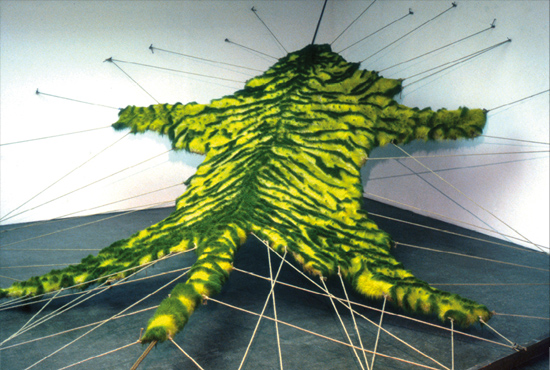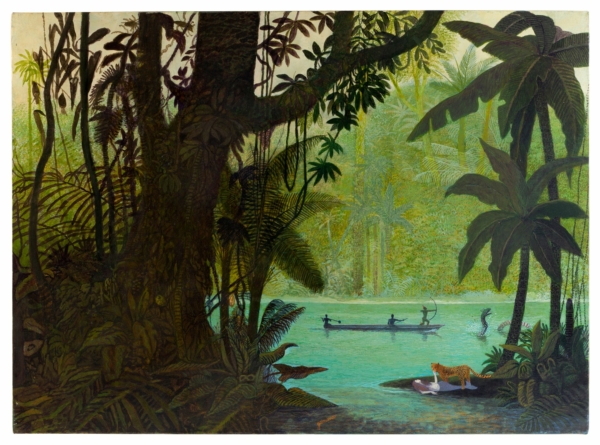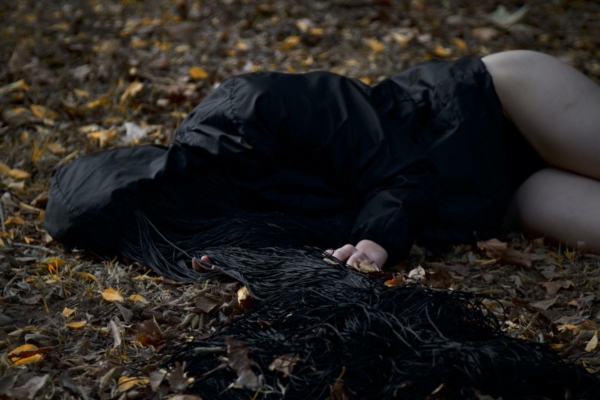
Appel à résidences – les Nuits des Forêts 2026
En 2026, le festival Nuits des Forêts invite les artistes à prêter l’oreille au vivant. À travers un appel à…

Here Today… the exhibition is separated into 8 different chapters exploring the challenges that face our precious environment.
Nature and the variety of species on earth are fundamental to human wellbeing. They provide us with food, clean air and water, energy, shelter, medicine, recreation and inspiration. Nature is too precious to lose. Andy Warhol’s iconic Endangered Species series sets the scene providing a ‘voice of warning from the past’. Warhol drew attention to the plight of endangered animals through his art in 1983, now 30 years later, what has changed?
Over-consumption, mass consumerism, waste, and disregard for our planet have devastating ecological impacts. Although a relatively new problem, ocean plastic pollution affects ocean ecosystems, biodiversity and human health at an alarming rate, costing USD 13 billion in damage to marine ecosystems each year. Currently, four giant garbage gyres inhabit the oceans. The largest of them approximates the state of Texas in size. Nearly half of documented seabird species are found with plastic on or inside their bodies. Fish also ingest plastics and micro-plastics, which can end up on our plates.
Plants, trees, birds and bees ensure the sustainability of our environment. Plants play a critical role in our ecosystems: they cycle water, and help prevent landslides and coastal erosion. Crucially, they remove carbon dioxide from the atmosphere and replace it with the oxygen that is critical to the survival of all living creatures. Bees and birds help in the reproduction of nearly 75% of the world’s flowering plants. Should pollinators disappear, the cost of replacing their service would be around USD 300 billion.
Climate change impacts upon us all, especially the equatorial and polar regions of the globe. Changes in temperature and rainfall patterns disturb food availability, habitats, and the timing of biological events. Indigenous women in South America report that climate change has negated the efficacy of their medicinal plants. The Polar Bear has come to symbolise the effects of global warming on the natural world, and the importance of climate stability to the health and wellbeing of ecosystems and people.
Today we are witnessing an escalating poaching crisis. Organised, cross-border environmental crime undermines the survival of such beloved species as elephants, rhinos, and tigers. Over 1,000 rhinos were illegally killed in South Africa in 2013, and 700 have been killed so far this year. If this trend continues, the rhino will become extinct in our lifetime. Estimates place the monetary value of transnational, organised environmental crime at between USD 70 and USD 213 billion annually.
Untenable fishing practices result in fish caught too young and in greater numbers than are recoverable. If we continue at our current rate, scientists estimate that the oceans will have only jellyfish left in them by 2100. The Polar Bear has come to symbolise the effects of global warming on the natural world, and the importance of climate stability to the health and wellbeing of ecosystems and people.
Sadly, we have lost some of our conservationist battles, resulting in extinction. Many people are familiar with the Dodo bird, lost in the 17th century, but thousands of species disappear each year. Recently extinct species include the Lesser Bilby (Australian marsupial), the Thylacine (Australian marsupial), and the Golden Toad (not seen since 1989). These species fell prey to animals introduced into their habitats, hunting, and/or the effects of global warming. Those probably extinct (but still listed as Critically Endangered) include the Baiji (freshwater porpoise) and the Black-faced honeycreeper (Hawaiian bird).
Here Today….Here Tomorrow! Fortunately, conservation and collective efforts inspire positive change. The IUCN Red List has assessed over 74,000 species in its 50 years of existence, and their list includes those whose populations have increased. Recently, 64 plants, birds, and amphibian species have improved in status thanks to effective conservation action. Some of today’s most exciting creative practitioners and thinkers exhibit ideas and innovations to help reverse the negative effects of climate change and sustain our planet for tomorrow… and show us how we can start in our own back yard. Please visit the Red List for more information.
Here Today
Celebrating 50 years of the IUCN Red List
25 Nov – 17 Dec 2014
The Old Sorting Office, London WC1
more information: heretoday.org
En 2026, le festival Nuits des Forêts invite les artistes à prêter l’oreille au vivant. À travers un appel à…
le Center for Art, Research and Alliances (CARA) à New York présente The Earth, the Fire, the Water, and the…
Et si la frontière entre l’humain et le non-humain n’était qu’une construction fictionnelle — et si ces fictions pouvaient être…

